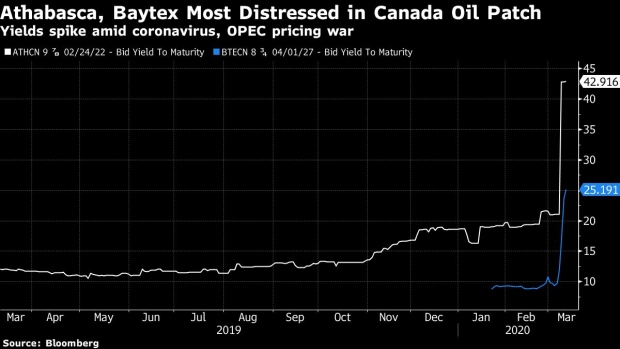Mar 11, 2020
Oil’s ‘Dire Circumstances’ Create Swift Losses for Bond Buyers
, Bloomberg News

(Bloomberg) -- Tumbling oil prices are separating the strong from the weak in Canada’s energy sector.
Energy bonds have plummeted this week, with some falling as much as 30 cents on the dollar. Half of the notes of Canadian energy companies in the Bloomberg Barclays Global High Yield Index are now trading in distressed territory. That compares with about 10% last week, according to data compiled by Bloomberg.
A bond is usually defined as distressed when its yield is 1,000 basis points, or 10 percentage points, over the government benchmark.
Investors in some high-yield issues have lost money with breathtaking speed. On Jan. 22, Baytex Energy Corp. sold $500 million in new bonds due 2027. The debt last exchanged hands at about 50 cents on the dollar, implying a yield of 24%, nearly three times its coupon.
The coronavirus and the disintegration of the OPEC+ alliance have driven North American crude prices below $34 a barrel, casting doubt on whether energy companies with high debts can keep paying their bills, let alone repay what they owe. Canada’s oil sector is particularly exposed: the country’s heavy oil sells at a discount to West Texas Intermediate.
“The pain is widespread. Low oil prices are going to be here for a while, I’m afraid,” said James Spicer, a New York-based analyst at TD Securities. “Bond trading levels imply that companies are already distressed.”
‘Dire Circumstances’
Baytex and oil sands producer Athabasca Oil Corp. are the most distressed names in the patch, Bloomberg data show. Athabasca’s $450 million in notes due 2022 dropped more than 20 cents this week to trade just below 60 cents.
When marketing its bonds in January, Baytex went the extra mile to lure investors concerned about the impact of the coronavirus on energy demand. It agreed to change the restricted payments clause, while reinforcing that the company doesn’t have any plans to pay dividends and will focus on paying down debt.
Other new issues have been hit hard. MEG Energy Corp. in January sold $1.2 billion in notes due 2027; they are trading at less than 70 cents on the dollar to yield 14.5%. Athabasca, Baytex and MEG did not reply to requests for comment.
While half of the bonds in the energy high-yield universe are in distressed territory, the majority of the debt is not due until a few years from now, giving the companies some breathing room while they wait for oil to rebound.
For Neil Selfe, founder and CEO of Toronto-based investment bank Infor Financial Group, it is too early to say if there will be a significant increase in debt restructurings. But the situation doesn’t look good, he said.
“The energy sector in Canada has been in a heightened state of restructuring the last five years and this only exacerbates the already dire circumstances,” he said. “If this continues, we are going to see many companies going out of business and many companies that obviously need to be restructured.”
In the investment grade universe, Cenovus Energy Inc. and Canadian Natural Resources Ltd. are the companies with the widest spread versus the Canadian BBB curve. Cenovus bonds due 2047 have slumped to 79 cents from 109 cents last Friday. The company has cut its capital spending budget by 32% this year.
Cenovus is monitoring the macroeconomic and oil price environment and will look for additional ways to reduce operating and capital spending if necessary, a representative said.
Still, the scenario shouldn’t weigh heavily on the nation’s biggest banks, Infor’s Selfe said.
“Large Canadian banks have had a lot of time to hedge or decrease their overall oil and gas exposure,” he said. “I don’t expect that we’re going to see significantly elevated loan losses because of what’s happened in the oil and gas sector.”
--With assistance from Nicolas Castellanos, Thomas Penaherrera and Esteban Duarte.
To contact the reporter on this story: Paula Sambo in Toronto at psambo@bloomberg.net
To contact the editors responsible for this story: Nikolaj Gammeltoft at ngammeltoft@bloomberg.net, Derek Decloet, Jacqueline Thorpe
©2020 Bloomberg L.P.


